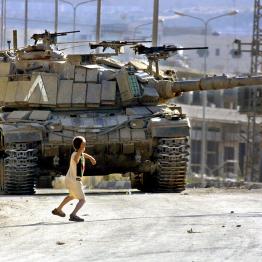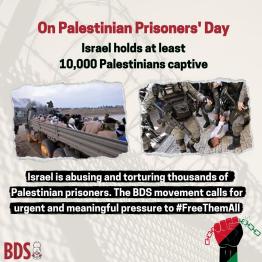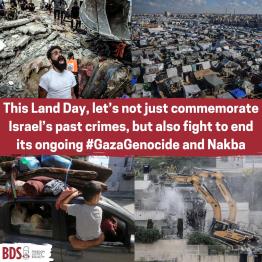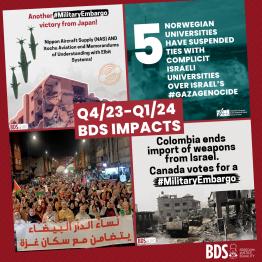Cairo donor conference: Palestinian civil society calls for public scrutiny of aid and zero complicity with Israeli violations of international law
Occupied Palestine, 12 October 2014 - As governments, aid agencies and the Palestinian Authority meet in Cairo to discuss Gaza reconstruction after Israel’s latest 51-day military assault last summer, the Palestinian BDS National Committee (BNC), the largest coalition of Palestinian civil society unions, political parties and organisations, condemns in the strongest terms the UN-brokered reconstruction mechanism, which further entrenches Israel’s illegal blockade of 1.8 million Palestinians in the occupied Gaza Strip, allows Israel to reap financial benefits from its war crimes and, therefore, encourages their continuation.
Donor money pledges are no substitute for holding Israel accountable for its grave violations of international law, including war crimes and crimes against humanity, and achieving justice for the Palestinian victims. The BNC calls on donors, international agencies and NGOs to adopt a clear and ethically responsible policy of transparency and zero complicity in aid delivery. The BNC also reiterates its call for a comprehensive and legally-binding military embargo on Israel and has delivered a petition with this demand to the UN.[1]
In addition, we call on states to support the UN Human Rights Council's Independent Investigation Commission into all violations of international humanitarian and human rights law committed in Gaza and elsewhere in the occupied Palestinian territory since June, with the aim of bringing those responsible to justice.
Israel’s blockade and repeated military assaults against the occupied Gaza Strip are part and parcel of systematic Israeli efforts to permanently separate the tiny Gaza Strip from the West Bank and “get rid” of its large Palestinian population, most of them refugees of the 1948 Nakba with unresolved rights and claims in Israel. Under the pretense of its redeployment out of Gaza in 2005, Israel treats the occupied Gaza Strip as a “separate” and “hostile” entity, violates the territorial integrity of the Occupied Palestinian Territory (OPT), and murders and imposes inhumane living conditions and collective punishment on Gaza’s Palestinian population. All of these are acts characteristic of a regime of colonialism and apartheid.
The BNC calls on UN agencies, the ICRC and international non-governmental organizations (INGOs), which will once more deliver a large chunk of reconstruction aid to Gaza, to end their active and ongoing complicity with Israel’s blockade. For over seven years, the UN, the ICRC and INGOs have operated within the confines of Israel’s policy of separation and collective punishment, while issuing only token calls for the blockade to be lifted. With the recently brokered reconstruction mechanism for Gaza, the UN has even gone a step further, by willingly taking on the management of aspects of the blockade on behalf of Israel in complete disregard for its international law obligations.[2]
No effort was made in all these years to physically break the Israeli blockade of Gaza, as the ICRC sought to do, for instance, with the sea blockade of Misrata (Libya) in 2011. Aid actors have also failed to adopt a collective position of refusal to cooperate with Israeli illegal demands, although they are required to do so and have done so in other contexts in order to put pressure on governments engaged in limiting humanitarian space. Why is a double standard used when dealing with Israel’s grave violations of international law and the dire humanitarian situation that result from them, particularly in Gaza?
One example of the complicity of aid agencies is a recent multi-million dollar contract awarded by UNDP to Mifram LTD[3], an Israeli company that develops mobile steel military watchtowers and checkpoints used in the occupied West Bank by the Israeli military to limit Palestinian freedom of movement and enable the ongoing colonization of Palestinian land.
Another example is the recent agreement of aid actors to source cement for the reconstruction of Gaza from Nesher, an Israeli company that illegally quarries in the occupied West Bank[4] and supplies cement for the construction of settlements, the Wall and other associated illegal infrastructure, all in blatant violation of international law. Millions of dollars are expected to flow to Nesher for the reconstruction of the 18,000 homes Israel wantonly destroyed in Gaza, helping Israel profit from its war crimes.
The BNC calls for public scrutiny of aid. Like governments and private business, agencies delivering aid to Palestinians must be held accountable for their routine disregard of the principle of “do no harm” and the promotion of political agendas through their operations. Previous attempts by Palestinian civil society to raise these issues have largely fallen on deaf ears. Promises of “follow up” by senior UN officials were quietly brushed aside, with no serious effort for transparency or accountability.
The BNC urges the UN, ICRC and INGOs operating in the OPT to present in writing steps for non-recognition, aid or assistance to the maintenance of the illegal situation created by Israel. In particular, we call for rules of procurement, which exclude companies, Israeli or other, that are complicit in Israel’s serious violations of international law and abuses of Palestinian human rights in the occupied West Bank (including East Jerusalem) and Gaza and which prevent Israeli profit or benefit from the humanitarian assistance process. We also call for a periodic mechanism of full disclosure of procurement contracts to the public, including Palestinian civil society.
[1] http://www.bdsmovement.net/2014/more-than-60000-signatories-including-nobel-prize-laureates-celebrities-and-religious-organizations-call-for-military-embargo-on-israel-ahead-of-gaza-donors-conference-12736
[2] http://www.theguardian.com/world/2014/oct/03/gaza-reconstruction-plan-un-israel-blockade
[3] http://procurement-notices.undp.org/view_awards.cfm (last accessed 12 October 2014)
[4] Israel is prohibited from exploiting the natural resources belonging to the OPT in a way that undermines their capital and results in economic benefits for Israeli citizens, including settlers, or for its national economy: http://www.alhaq.org/publications/publications-index/item/pillage-of-the...




